Tesco's Sustainability and Responsibility: An In-Depth Business Report
VerifiedAdded on 2023/06/10
|10
|2393
|387
Report
AI Summary
This report provides an in-depth analysis of Tesco's sustainability and corporate responsibility initiatives. It employs SWOT, VRIO, and PESTLE analyses to evaluate Tesco's internal strengths and weaknesses, as well as external opportunities and threats related to sustainability. The report highlights T...
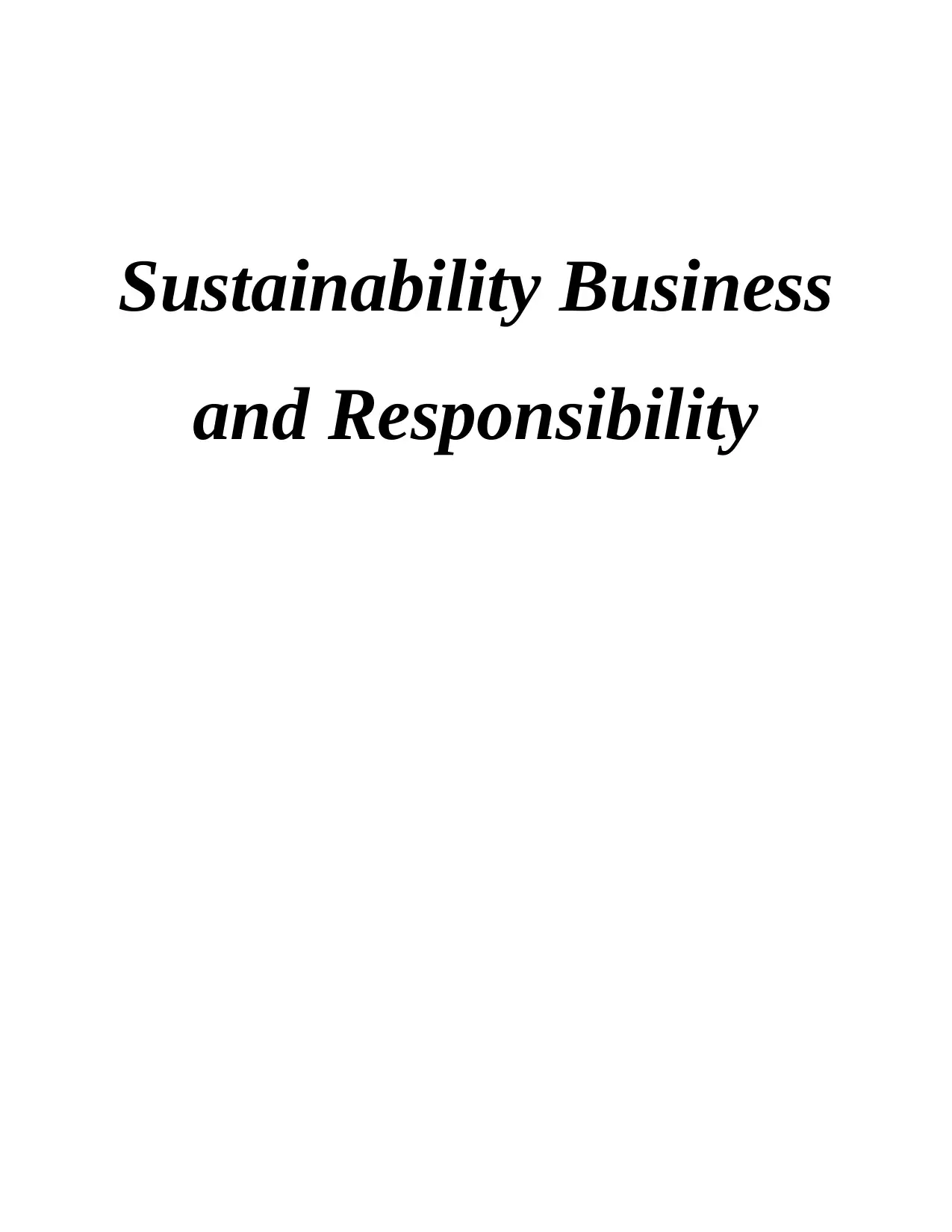
Sustainability Business
and Responsibility
and Responsibility
Paraphrase This Document
Need a fresh take? Get an instant paraphrase of this document with our AI Paraphraser
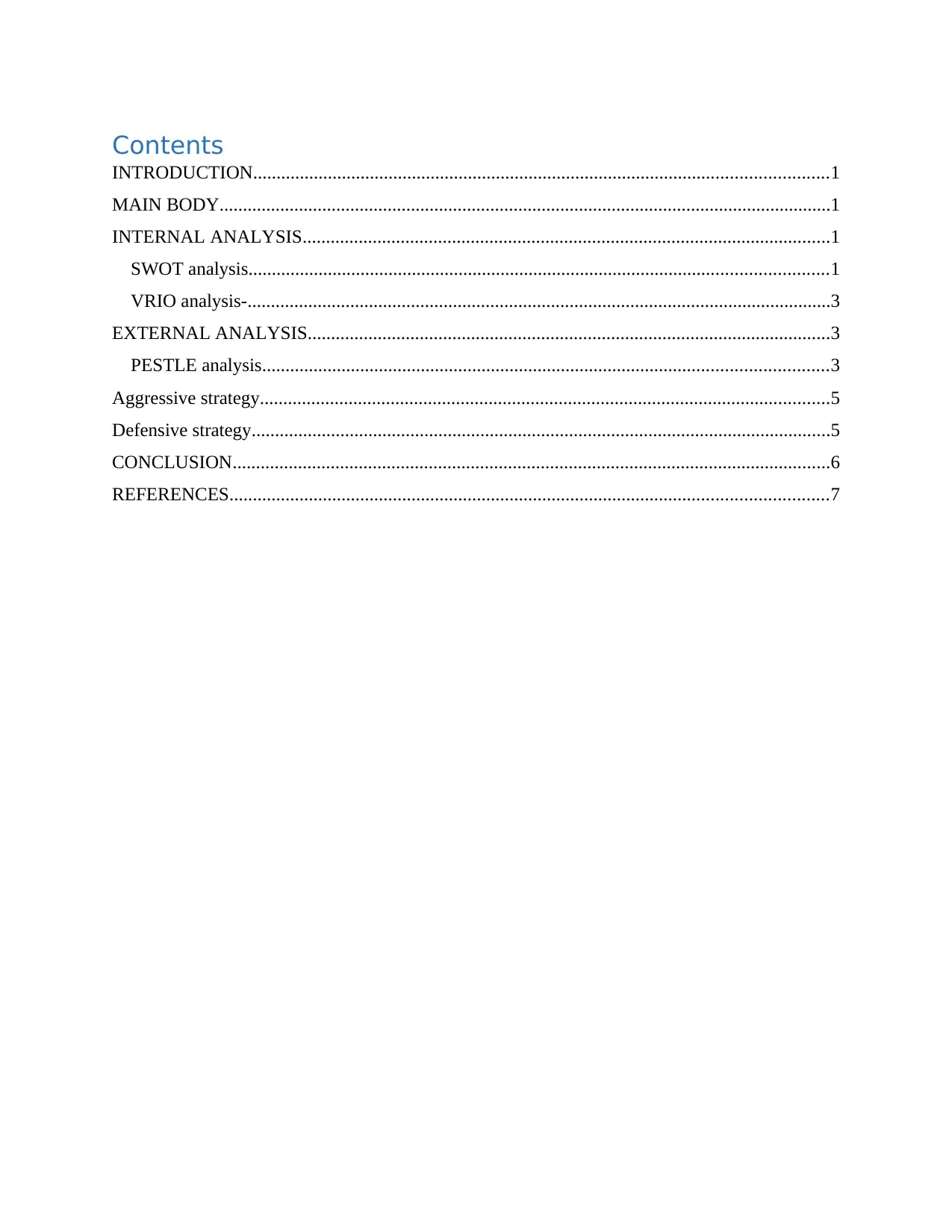
Contents
INTRODUCTION...........................................................................................................................1
MAIN BODY...................................................................................................................................1
INTERNAL ANALYSIS.................................................................................................................1
SWOT analysis............................................................................................................................1
VRIO analysis-.............................................................................................................................3
EXTERNAL ANALYSIS................................................................................................................3
PESTLE analysis.........................................................................................................................3
Aggressive strategy..........................................................................................................................5
Defensive strategy............................................................................................................................5
CONCLUSION................................................................................................................................6
REFERENCES................................................................................................................................7
INTRODUCTION...........................................................................................................................1
MAIN BODY...................................................................................................................................1
INTERNAL ANALYSIS.................................................................................................................1
SWOT analysis............................................................................................................................1
VRIO analysis-.............................................................................................................................3
EXTERNAL ANALYSIS................................................................................................................3
PESTLE analysis.........................................................................................................................3
Aggressive strategy..........................................................................................................................5
Defensive strategy............................................................................................................................5
CONCLUSION................................................................................................................................6
REFERENCES................................................................................................................................7

⊘ This is a preview!⊘
Do you want full access?
Subscribe today to unlock all pages.

Trusted by 1+ million students worldwide
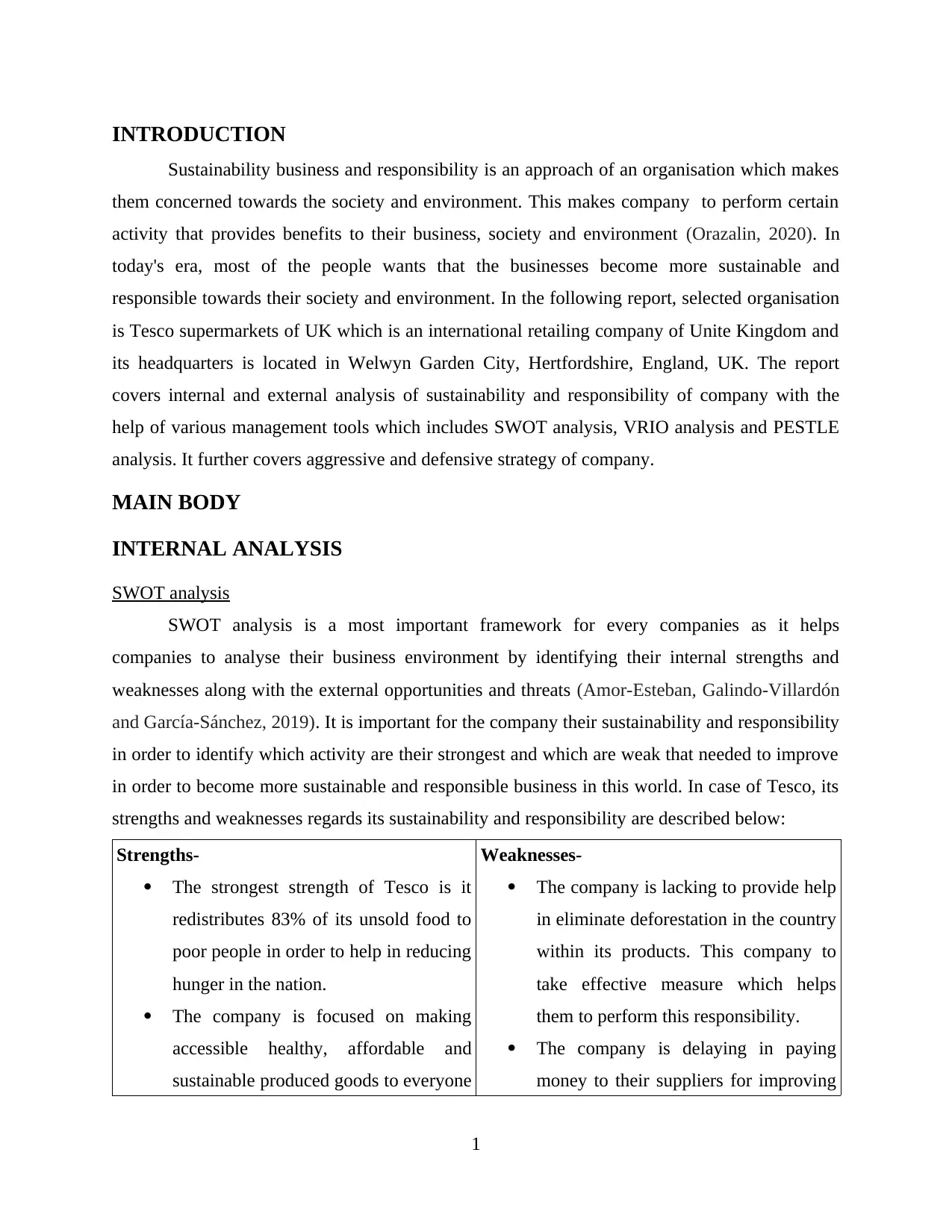
INTRODUCTION
Sustainability business and responsibility is an approach of an organisation which makes
them concerned towards the society and environment. This makes company to perform certain
activity that provides benefits to their business, society and environment (Orazalin, 2020). In
today's era, most of the people wants that the businesses become more sustainable and
responsible towards their society and environment. In the following report, selected organisation
is Tesco supermarkets of UK which is an international retailing company of Unite Kingdom and
its headquarters is located in Welwyn Garden City, Hertfordshire, England, UK. The report
covers internal and external analysis of sustainability and responsibility of company with the
help of various management tools which includes SWOT analysis, VRIO analysis and PESTLE
analysis. It further covers aggressive and defensive strategy of company.
MAIN BODY
INTERNAL ANALYSIS
SWOT analysis
SWOT analysis is a most important framework for every companies as it helps
companies to analyse their business environment by identifying their internal strengths and
weaknesses along with the external opportunities and threats (Amor-Esteban, Galindo-Villardón
and García-Sánchez, 2019). It is important for the company their sustainability and responsibility
in order to identify which activity are their strongest and which are weak that needed to improve
in order to become more sustainable and responsible business in this world. In case of Tesco, its
strengths and weaknesses regards its sustainability and responsibility are described below:
Strengths-
The strongest strength of Tesco is it
redistributes 83% of its unsold food to
poor people in order to help in reducing
hunger in the nation.
The company is focused on making
accessible healthy, affordable and
sustainable produced goods to everyone
Weaknesses-
The company is lacking to provide help
in eliminate deforestation in the country
within its products. This company to
take effective measure which helps
them to perform this responsibility.
The company is delaying in paying
money to their suppliers for improving
1
Sustainability business and responsibility is an approach of an organisation which makes
them concerned towards the society and environment. This makes company to perform certain
activity that provides benefits to their business, society and environment (Orazalin, 2020). In
today's era, most of the people wants that the businesses become more sustainable and
responsible towards their society and environment. In the following report, selected organisation
is Tesco supermarkets of UK which is an international retailing company of Unite Kingdom and
its headquarters is located in Welwyn Garden City, Hertfordshire, England, UK. The report
covers internal and external analysis of sustainability and responsibility of company with the
help of various management tools which includes SWOT analysis, VRIO analysis and PESTLE
analysis. It further covers aggressive and defensive strategy of company.
MAIN BODY
INTERNAL ANALYSIS
SWOT analysis
SWOT analysis is a most important framework for every companies as it helps
companies to analyse their business environment by identifying their internal strengths and
weaknesses along with the external opportunities and threats (Amor-Esteban, Galindo-Villardón
and García-Sánchez, 2019). It is important for the company their sustainability and responsibility
in order to identify which activity are their strongest and which are weak that needed to improve
in order to become more sustainable and responsible business in this world. In case of Tesco, its
strengths and weaknesses regards its sustainability and responsibility are described below:
Strengths-
The strongest strength of Tesco is it
redistributes 83% of its unsold food to
poor people in order to help in reducing
hunger in the nation.
The company is focused on making
accessible healthy, affordable and
sustainable produced goods to everyone
Weaknesses-
The company is lacking to provide help
in eliminate deforestation in the country
within its products. This company to
take effective measure which helps
them to perform this responsibility.
The company is delaying in paying
money to their suppliers for improving
1
Paraphrase This Document
Need a fresh take? Get an instant paraphrase of this document with our AI Paraphraser
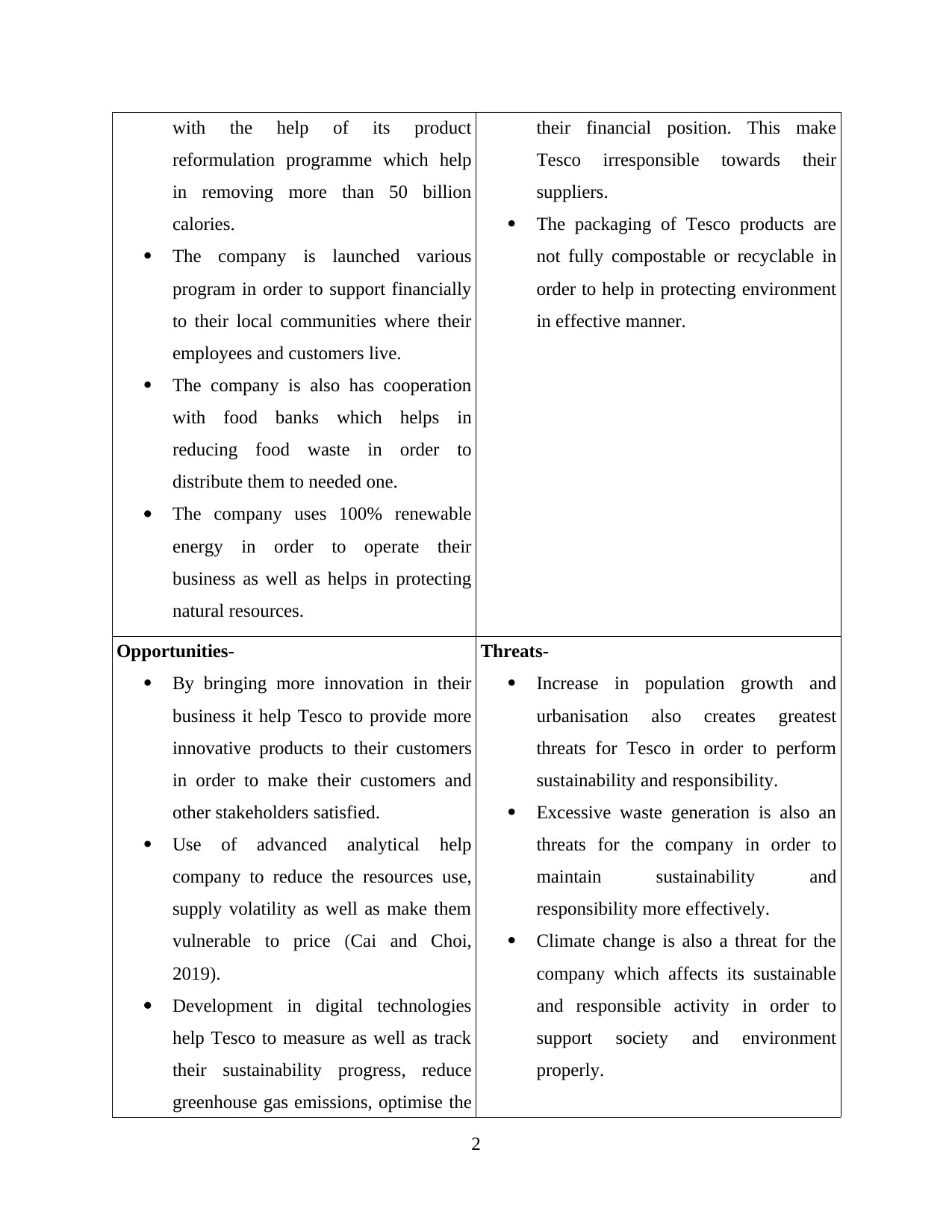
with the help of its product
reformulation programme which help
in removing more than 50 billion
calories.
The company is launched various
program in order to support financially
to their local communities where their
employees and customers live.
The company is also has cooperation
with food banks which helps in
reducing food waste in order to
distribute them to needed one.
The company uses 100% renewable
energy in order to operate their
business as well as helps in protecting
natural resources.
their financial position. This make
Tesco irresponsible towards their
suppliers.
The packaging of Tesco products are
not fully compostable or recyclable in
order to help in protecting environment
in effective manner.
Opportunities-
By bringing more innovation in their
business it help Tesco to provide more
innovative products to their customers
in order to make their customers and
other stakeholders satisfied.
Use of advanced analytical help
company to reduce the resources use,
supply volatility as well as make them
vulnerable to price (Cai and Choi,
2019).
Development in digital technologies
help Tesco to measure as well as track
their sustainability progress, reduce
greenhouse gas emissions, optimise the
Threats-
Increase in population growth and
urbanisation also creates greatest
threats for Tesco in order to perform
sustainability and responsibility.
Excessive waste generation is also an
threats for the company in order to
maintain sustainability and
responsibility more effectively.
Climate change is also a threat for the
company which affects its sustainable
and responsible activity in order to
support society and environment
properly.
2
reformulation programme which help
in removing more than 50 billion
calories.
The company is launched various
program in order to support financially
to their local communities where their
employees and customers live.
The company is also has cooperation
with food banks which helps in
reducing food waste in order to
distribute them to needed one.
The company uses 100% renewable
energy in order to operate their
business as well as helps in protecting
natural resources.
their financial position. This make
Tesco irresponsible towards their
suppliers.
The packaging of Tesco products are
not fully compostable or recyclable in
order to help in protecting environment
in effective manner.
Opportunities-
By bringing more innovation in their
business it help Tesco to provide more
innovative products to their customers
in order to make their customers and
other stakeholders satisfied.
Use of advanced analytical help
company to reduce the resources use,
supply volatility as well as make them
vulnerable to price (Cai and Choi,
2019).
Development in digital technologies
help Tesco to measure as well as track
their sustainability progress, reduce
greenhouse gas emissions, optimise the
Threats-
Increase in population growth and
urbanisation also creates greatest
threats for Tesco in order to perform
sustainability and responsibility.
Excessive waste generation is also an
threats for the company in order to
maintain sustainability and
responsibility more effectively.
Climate change is also a threat for the
company which affects its sustainable
and responsible activity in order to
support society and environment
properly.
2
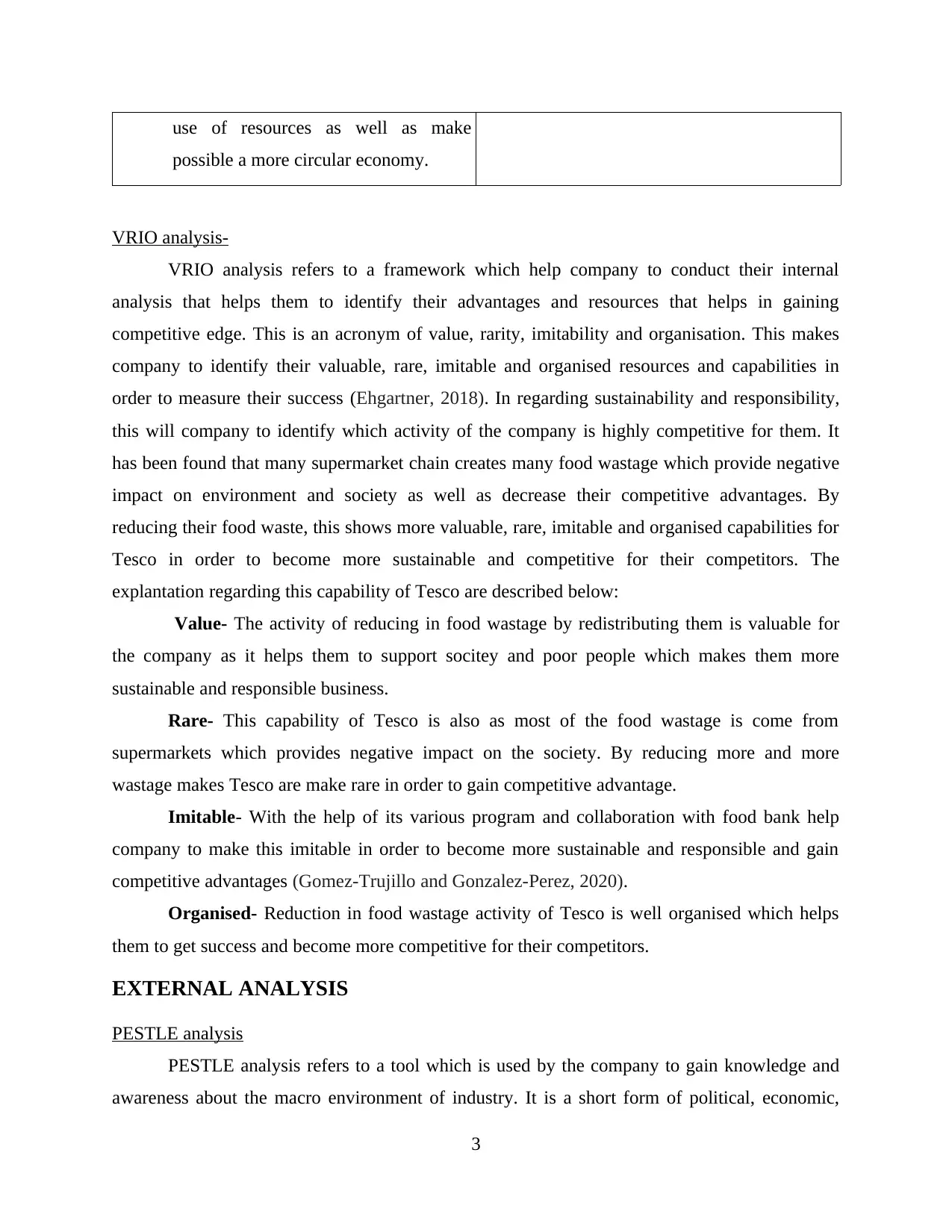
use of resources as well as make
possible a more circular economy.
VRIO analysis-
VRIO analysis refers to a framework which help company to conduct their internal
analysis that helps them to identify their advantages and resources that helps in gaining
competitive edge. This is an acronym of value, rarity, imitability and organisation. This makes
company to identify their valuable, rare, imitable and organised resources and capabilities in
order to measure their success (Ehgartner, 2018). In regarding sustainability and responsibility,
this will company to identify which activity of the company is highly competitive for them. It
has been found that many supermarket chain creates many food wastage which provide negative
impact on environment and society as well as decrease their competitive advantages. By
reducing their food waste, this shows more valuable, rare, imitable and organised capabilities for
Tesco in order to become more sustainable and competitive for their competitors. The
explantation regarding this capability of Tesco are described below:
Value- The activity of reducing in food wastage by redistributing them is valuable for
the company as it helps them to support socitey and poor people which makes them more
sustainable and responsible business.
Rare- This capability of Tesco is also as most of the food wastage is come from
supermarkets which provides negative impact on the society. By reducing more and more
wastage makes Tesco are make rare in order to gain competitive advantage.
Imitable- With the help of its various program and collaboration with food bank help
company to make this imitable in order to become more sustainable and responsible and gain
competitive advantages (Gomez-Trujillo and Gonzalez-Perez, 2020).
Organised- Reduction in food wastage activity of Tesco is well organised which helps
them to get success and become more competitive for their competitors.
EXTERNAL ANALYSIS
PESTLE analysis
PESTLE analysis refers to a tool which is used by the company to gain knowledge and
awareness about the macro environment of industry. It is a short form of political, economic,
3
possible a more circular economy.
VRIO analysis-
VRIO analysis refers to a framework which help company to conduct their internal
analysis that helps them to identify their advantages and resources that helps in gaining
competitive edge. This is an acronym of value, rarity, imitability and organisation. This makes
company to identify their valuable, rare, imitable and organised resources and capabilities in
order to measure their success (Ehgartner, 2018). In regarding sustainability and responsibility,
this will company to identify which activity of the company is highly competitive for them. It
has been found that many supermarket chain creates many food wastage which provide negative
impact on environment and society as well as decrease their competitive advantages. By
reducing their food waste, this shows more valuable, rare, imitable and organised capabilities for
Tesco in order to become more sustainable and competitive for their competitors. The
explantation regarding this capability of Tesco are described below:
Value- The activity of reducing in food wastage by redistributing them is valuable for
the company as it helps them to support socitey and poor people which makes them more
sustainable and responsible business.
Rare- This capability of Tesco is also as most of the food wastage is come from
supermarkets which provides negative impact on the society. By reducing more and more
wastage makes Tesco are make rare in order to gain competitive advantage.
Imitable- With the help of its various program and collaboration with food bank help
company to make this imitable in order to become more sustainable and responsible and gain
competitive advantages (Gomez-Trujillo and Gonzalez-Perez, 2020).
Organised- Reduction in food wastage activity of Tesco is well organised which helps
them to get success and become more competitive for their competitors.
EXTERNAL ANALYSIS
PESTLE analysis
PESTLE analysis refers to a tool which is used by the company to gain knowledge and
awareness about the macro environment of industry. It is a short form of political, economic,
3
⊘ This is a preview!⊘
Do you want full access?
Subscribe today to unlock all pages.

Trusted by 1+ million students worldwide
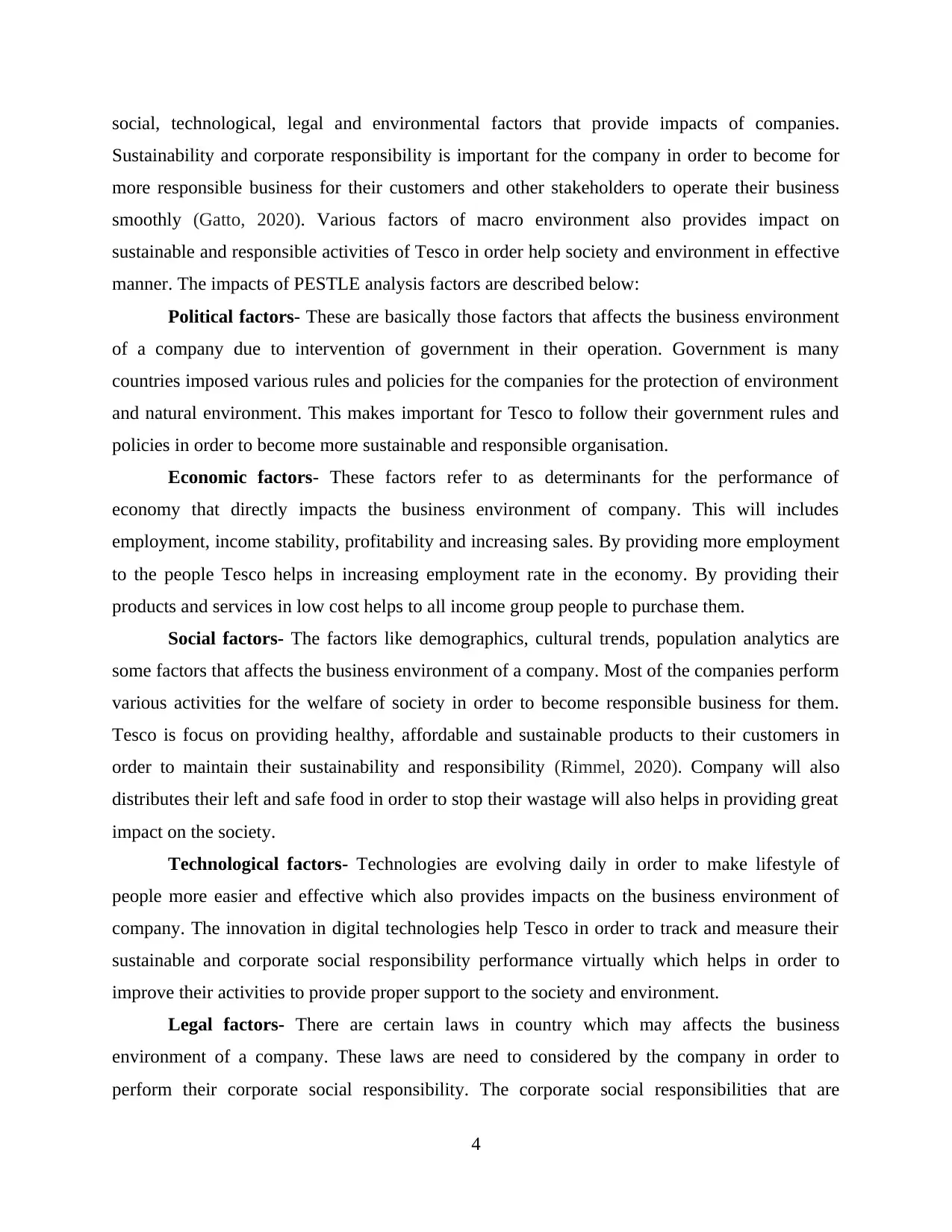
social, technological, legal and environmental factors that provide impacts of companies.
Sustainability and corporate responsibility is important for the company in order to become for
more responsible business for their customers and other stakeholders to operate their business
smoothly (Gatto, 2020). Various factors of macro environment also provides impact on
sustainable and responsible activities of Tesco in order help society and environment in effective
manner. The impacts of PESTLE analysis factors are described below:
Political factors- These are basically those factors that affects the business environment
of a company due to intervention of government in their operation. Government is many
countries imposed various rules and policies for the companies for the protection of environment
and natural environment. This makes important for Tesco to follow their government rules and
policies in order to become more sustainable and responsible organisation.
Economic factors- These factors refer to as determinants for the performance of
economy that directly impacts the business environment of company. This will includes
employment, income stability, profitability and increasing sales. By providing more employment
to the people Tesco helps in increasing employment rate in the economy. By providing their
products and services in low cost helps to all income group people to purchase them.
Social factors- The factors like demographics, cultural trends, population analytics are
some factors that affects the business environment of a company. Most of the companies perform
various activities for the welfare of society in order to become responsible business for them.
Tesco is focus on providing healthy, affordable and sustainable products to their customers in
order to maintain their sustainability and responsibility (Rimmel, 2020). Company will also
distributes their left and safe food in order to stop their wastage will also helps in providing great
impact on the society.
Technological factors- Technologies are evolving daily in order to make lifestyle of
people more easier and effective which also provides impacts on the business environment of
company. The innovation in digital technologies help Tesco in order to track and measure their
sustainable and corporate social responsibility performance virtually which helps in order to
improve their activities to provide proper support to the society and environment.
Legal factors- There are certain laws in country which may affects the business
environment of a company. These laws are need to considered by the company in order to
perform their corporate social responsibility. The corporate social responsibilities that are
4
Sustainability and corporate responsibility is important for the company in order to become for
more responsible business for their customers and other stakeholders to operate their business
smoothly (Gatto, 2020). Various factors of macro environment also provides impact on
sustainable and responsible activities of Tesco in order help society and environment in effective
manner. The impacts of PESTLE analysis factors are described below:
Political factors- These are basically those factors that affects the business environment
of a company due to intervention of government in their operation. Government is many
countries imposed various rules and policies for the companies for the protection of environment
and natural environment. This makes important for Tesco to follow their government rules and
policies in order to become more sustainable and responsible organisation.
Economic factors- These factors refer to as determinants for the performance of
economy that directly impacts the business environment of company. This will includes
employment, income stability, profitability and increasing sales. By providing more employment
to the people Tesco helps in increasing employment rate in the economy. By providing their
products and services in low cost helps to all income group people to purchase them.
Social factors- The factors like demographics, cultural trends, population analytics are
some factors that affects the business environment of a company. Most of the companies perform
various activities for the welfare of society in order to become responsible business for them.
Tesco is focus on providing healthy, affordable and sustainable products to their customers in
order to maintain their sustainability and responsibility (Rimmel, 2020). Company will also
distributes their left and safe food in order to stop their wastage will also helps in providing great
impact on the society.
Technological factors- Technologies are evolving daily in order to make lifestyle of
people more easier and effective which also provides impacts on the business environment of
company. The innovation in digital technologies help Tesco in order to track and measure their
sustainable and corporate social responsibility performance virtually which helps in order to
improve their activities to provide proper support to the society and environment.
Legal factors- There are certain laws in country which may affects the business
environment of a company. These laws are need to considered by the company in order to
perform their corporate social responsibility. The corporate social responsibilities that are
4
Paraphrase This Document
Need a fresh take? Get an instant paraphrase of this document with our AI Paraphraser
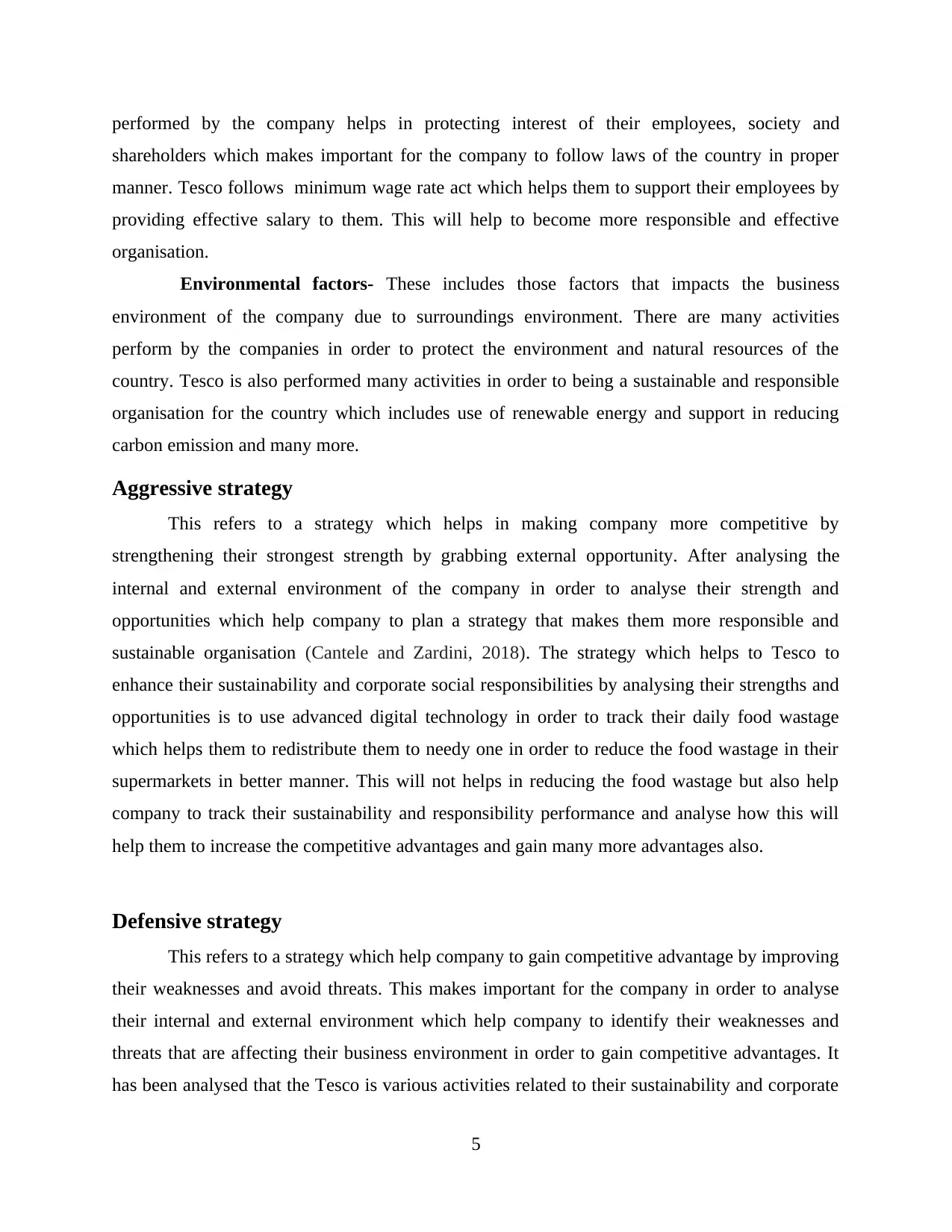
performed by the company helps in protecting interest of their employees, society and
shareholders which makes important for the company to follow laws of the country in proper
manner. Tesco follows minimum wage rate act which helps them to support their employees by
providing effective salary to them. This will help to become more responsible and effective
organisation.
Environmental factors- These includes those factors that impacts the business
environment of the company due to surroundings environment. There are many activities
perform by the companies in order to protect the environment and natural resources of the
country. Tesco is also performed many activities in order to being a sustainable and responsible
organisation for the country which includes use of renewable energy and support in reducing
carbon emission and many more.
Aggressive strategy
This refers to a strategy which helps in making company more competitive by
strengthening their strongest strength by grabbing external opportunity. After analysing the
internal and external environment of the company in order to analyse their strength and
opportunities which help company to plan a strategy that makes them more responsible and
sustainable organisation (Cantele and Zardini, 2018). The strategy which helps to Tesco to
enhance their sustainability and corporate social responsibilities by analysing their strengths and
opportunities is to use advanced digital technology in order to track their daily food wastage
which helps them to redistribute them to needy one in order to reduce the food wastage in their
supermarkets in better manner. This will not helps in reducing the food wastage but also help
company to track their sustainability and responsibility performance and analyse how this will
help them to increase the competitive advantages and gain many more advantages also.
Defensive strategy
This refers to a strategy which help company to gain competitive advantage by improving
their weaknesses and avoid threats. This makes important for the company in order to analyse
their internal and external environment which help company to identify their weaknesses and
threats that are affecting their business environment in order to gain competitive advantages. It
has been analysed that the Tesco is various activities related to their sustainability and corporate
5
shareholders which makes important for the company to follow laws of the country in proper
manner. Tesco follows minimum wage rate act which helps them to support their employees by
providing effective salary to them. This will help to become more responsible and effective
organisation.
Environmental factors- These includes those factors that impacts the business
environment of the company due to surroundings environment. There are many activities
perform by the companies in order to protect the environment and natural resources of the
country. Tesco is also performed many activities in order to being a sustainable and responsible
organisation for the country which includes use of renewable energy and support in reducing
carbon emission and many more.
Aggressive strategy
This refers to a strategy which helps in making company more competitive by
strengthening their strongest strength by grabbing external opportunity. After analysing the
internal and external environment of the company in order to analyse their strength and
opportunities which help company to plan a strategy that makes them more responsible and
sustainable organisation (Cantele and Zardini, 2018). The strategy which helps to Tesco to
enhance their sustainability and corporate social responsibilities by analysing their strengths and
opportunities is to use advanced digital technology in order to track their daily food wastage
which helps them to redistribute them to needy one in order to reduce the food wastage in their
supermarkets in better manner. This will not helps in reducing the food wastage but also help
company to track their sustainability and responsibility performance and analyse how this will
help them to increase the competitive advantages and gain many more advantages also.
Defensive strategy
This refers to a strategy which help company to gain competitive advantage by improving
their weaknesses and avoid threats. This makes important for the company in order to analyse
their internal and external environment which help company to identify their weaknesses and
threats that are affecting their business environment in order to gain competitive advantages. It
has been analysed that the Tesco is various activities related to their sustainability and corporate
5
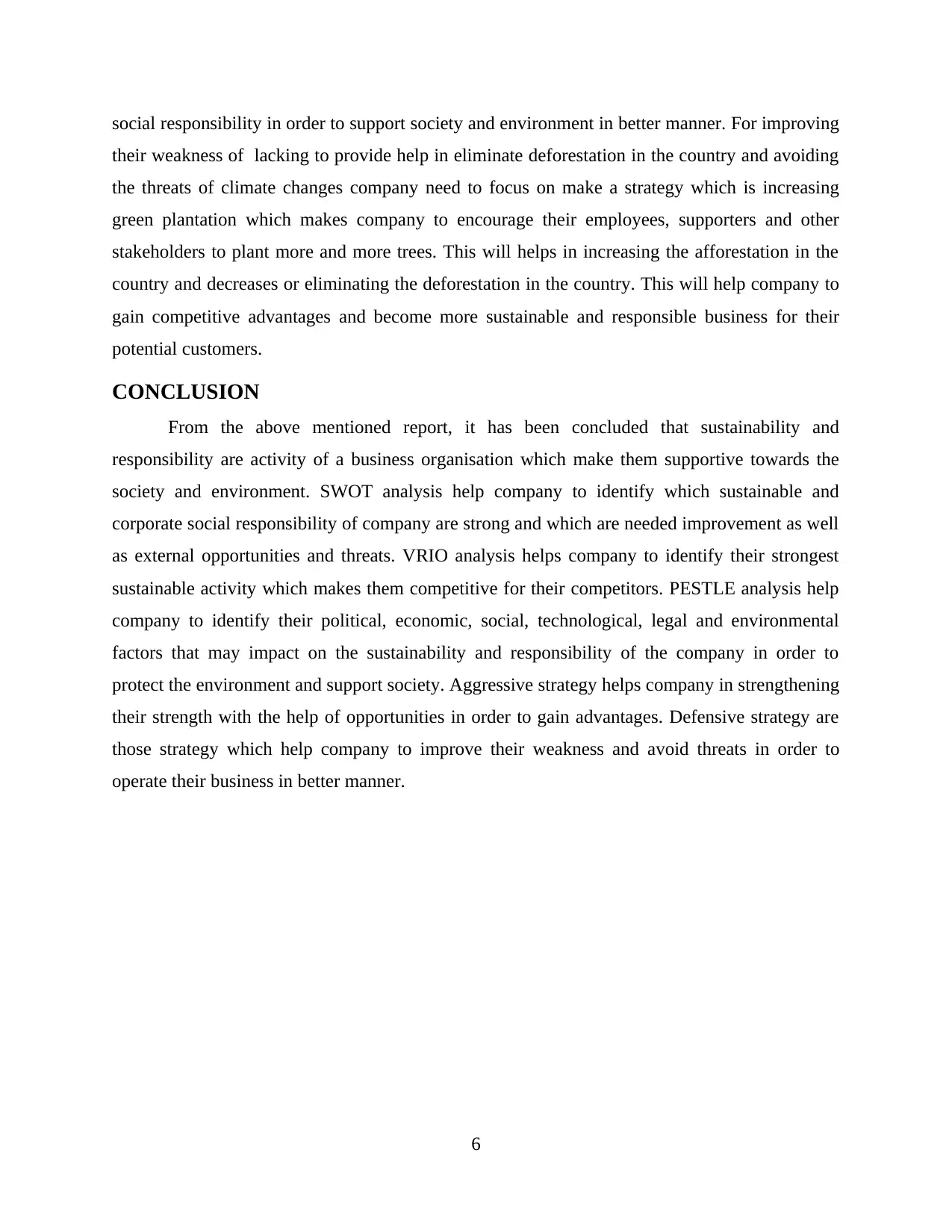
social responsibility in order to support society and environment in better manner. For improving
their weakness of lacking to provide help in eliminate deforestation in the country and avoiding
the threats of climate changes company need to focus on make a strategy which is increasing
green plantation which makes company to encourage their employees, supporters and other
stakeholders to plant more and more trees. This will helps in increasing the afforestation in the
country and decreases or eliminating the deforestation in the country. This will help company to
gain competitive advantages and become more sustainable and responsible business for their
potential customers.
CONCLUSION
From the above mentioned report, it has been concluded that sustainability and
responsibility are activity of a business organisation which make them supportive towards the
society and environment. SWOT analysis help company to identify which sustainable and
corporate social responsibility of company are strong and which are needed improvement as well
as external opportunities and threats. VRIO analysis helps company to identify their strongest
sustainable activity which makes them competitive for their competitors. PESTLE analysis help
company to identify their political, economic, social, technological, legal and environmental
factors that may impact on the sustainability and responsibility of the company in order to
protect the environment and support society. Aggressive strategy helps company in strengthening
their strength with the help of opportunities in order to gain advantages. Defensive strategy are
those strategy which help company to improve their weakness and avoid threats in order to
operate their business in better manner.
6
their weakness of lacking to provide help in eliminate deforestation in the country and avoiding
the threats of climate changes company need to focus on make a strategy which is increasing
green plantation which makes company to encourage their employees, supporters and other
stakeholders to plant more and more trees. This will helps in increasing the afforestation in the
country and decreases or eliminating the deforestation in the country. This will help company to
gain competitive advantages and become more sustainable and responsible business for their
potential customers.
CONCLUSION
From the above mentioned report, it has been concluded that sustainability and
responsibility are activity of a business organisation which make them supportive towards the
society and environment. SWOT analysis help company to identify which sustainable and
corporate social responsibility of company are strong and which are needed improvement as well
as external opportunities and threats. VRIO analysis helps company to identify their strongest
sustainable activity which makes them competitive for their competitors. PESTLE analysis help
company to identify their political, economic, social, technological, legal and environmental
factors that may impact on the sustainability and responsibility of the company in order to
protect the environment and support society. Aggressive strategy helps company in strengthening
their strength with the help of opportunities in order to gain advantages. Defensive strategy are
those strategy which help company to improve their weakness and avoid threats in order to
operate their business in better manner.
6
⊘ This is a preview!⊘
Do you want full access?
Subscribe today to unlock all pages.

Trusted by 1+ million students worldwide
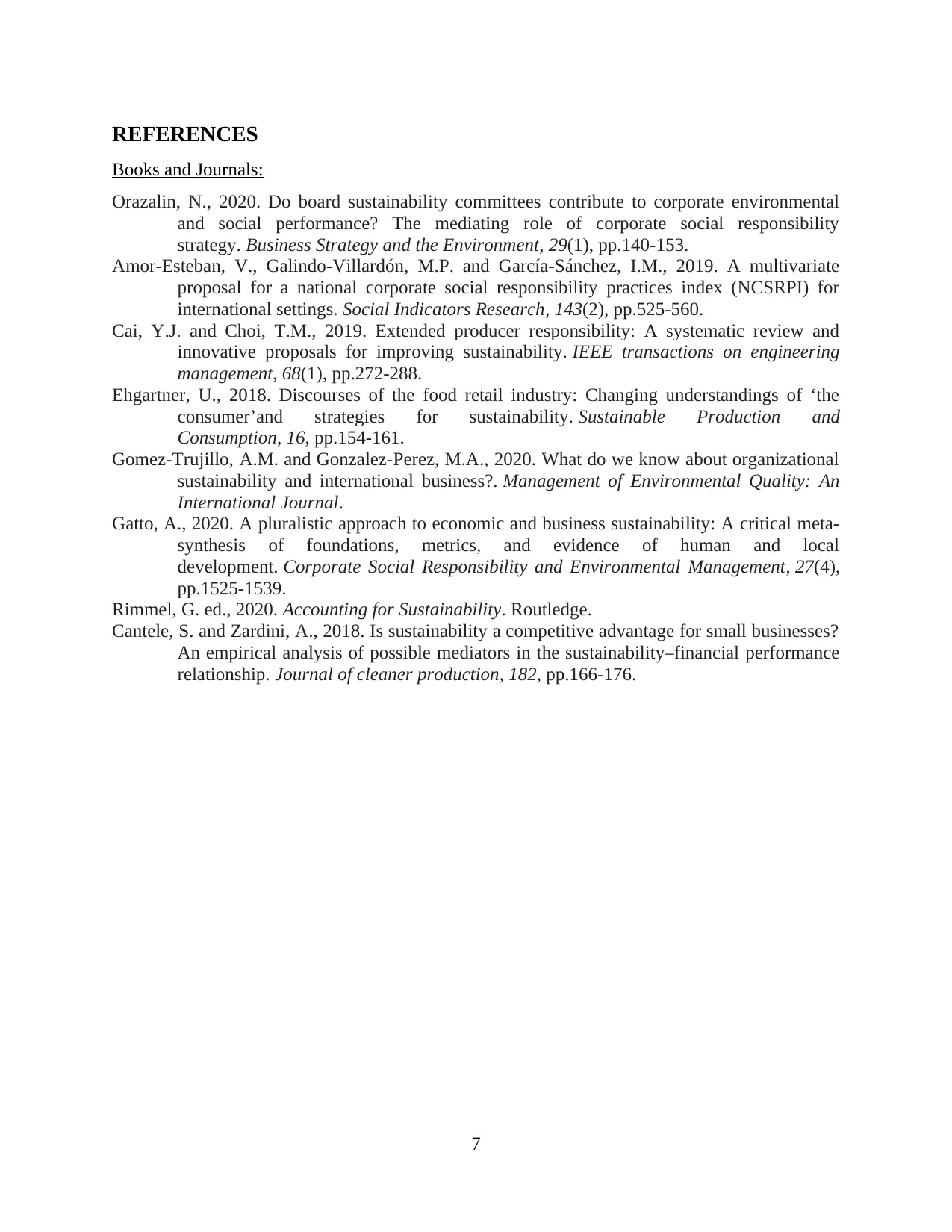
REFERENCES
Books and Journals:
Orazalin, N., 2020. Do board sustainability committees contribute to corporate environmental
and social performance? The mediating role of corporate social responsibility
strategy. Business Strategy and the Environment, 29(1), pp.140-153.
Amor-Esteban, V., Galindo-Villardón, M.P. and García-Sánchez, I.M., 2019. A multivariate
proposal for a national corporate social responsibility practices index (NCSRPI) for
international settings. Social Indicators Research, 143(2), pp.525-560.
Cai, Y.J. and Choi, T.M., 2019. Extended producer responsibility: A systematic review and
innovative proposals for improving sustainability. IEEE transactions on engineering
management, 68(1), pp.272-288.
Ehgartner, U., 2018. Discourses of the food retail industry: Changing understandings of ‘the
consumer’and strategies for sustainability. Sustainable Production and
Consumption, 16, pp.154-161.
Gomez-Trujillo, A.M. and Gonzalez-Perez, M.A., 2020. What do we know about organizational
sustainability and international business?. Management of Environmental Quality: An
International Journal.
Gatto, A., 2020. A pluralistic approach to economic and business sustainability: A critical meta‐
synthesis of foundations, metrics, and evidence of human and local
development. Corporate Social Responsibility and Environmental Management, 27(4),
pp.1525-1539.
Rimmel, G. ed., 2020. Accounting for Sustainability. Routledge.
Cantele, S. and Zardini, A., 2018. Is sustainability a competitive advantage for small businesses?
An empirical analysis of possible mediators in the sustainability–financial performance
relationship. Journal of cleaner production, 182, pp.166-176.
7
Books and Journals:
Orazalin, N., 2020. Do board sustainability committees contribute to corporate environmental
and social performance? The mediating role of corporate social responsibility
strategy. Business Strategy and the Environment, 29(1), pp.140-153.
Amor-Esteban, V., Galindo-Villardón, M.P. and García-Sánchez, I.M., 2019. A multivariate
proposal for a national corporate social responsibility practices index (NCSRPI) for
international settings. Social Indicators Research, 143(2), pp.525-560.
Cai, Y.J. and Choi, T.M., 2019. Extended producer responsibility: A systematic review and
innovative proposals for improving sustainability. IEEE transactions on engineering
management, 68(1), pp.272-288.
Ehgartner, U., 2018. Discourses of the food retail industry: Changing understandings of ‘the
consumer’and strategies for sustainability. Sustainable Production and
Consumption, 16, pp.154-161.
Gomez-Trujillo, A.M. and Gonzalez-Perez, M.A., 2020. What do we know about organizational
sustainability and international business?. Management of Environmental Quality: An
International Journal.
Gatto, A., 2020. A pluralistic approach to economic and business sustainability: A critical meta‐
synthesis of foundations, metrics, and evidence of human and local
development. Corporate Social Responsibility and Environmental Management, 27(4),
pp.1525-1539.
Rimmel, G. ed., 2020. Accounting for Sustainability. Routledge.
Cantele, S. and Zardini, A., 2018. Is sustainability a competitive advantage for small businesses?
An empirical analysis of possible mediators in the sustainability–financial performance
relationship. Journal of cleaner production, 182, pp.166-176.
7
1 out of 10
Related Documents
Your All-in-One AI-Powered Toolkit for Academic Success.
+13062052269
info@desklib.com
Available 24*7 on WhatsApp / Email
![[object Object]](/_next/static/media/star-bottom.7253800d.svg)
Unlock your academic potential
© 2024 | Zucol Services PVT LTD | All rights reserved.



